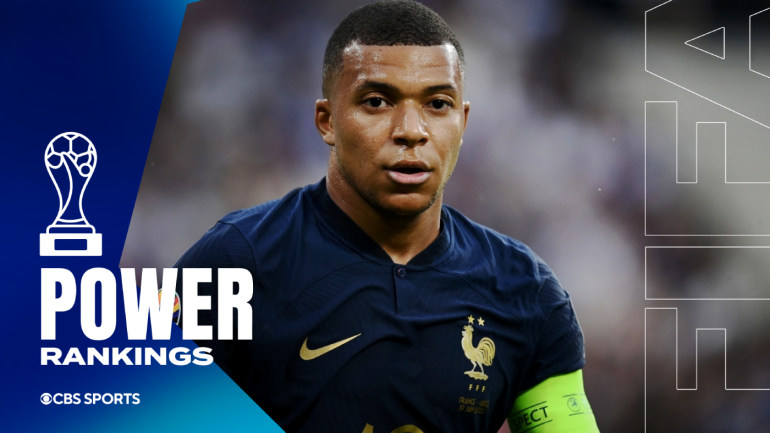
International football is back and with it the road to the 2026 World Cup has begun. South America is kicking off its mammoth, thrilling league that culminates in six teams booking their spots in the USA, Canada and Mexico. With Asian and African qualifying also due to begin before the end of 2023, it's time to take a look ahead at who is best placed to win the next World Cup:
1. France (--)
For starters, we can reasonably assume that at age 27 Kylian Mbappe will be one of the best, if not the very best, footballers in the world come 2026, a player who has already proven that he will deliver on the biggest stage. Perhaps the only reason to doubt him is that there will be so many miles on the clock for a player who will have been at the game's peak for almost a decade. It seems distinctly credible that in North America he will get the four goals he needs to become the World Cup's record goalscorer. He already lies in the pantheon of its greatest-ever players.

Golazo Starting XI Newsletter
Get your Soccer Fix from Around the Globe
Your ultimate guide to the Beautiful Game as our experts take you beyond the pitch and around the globe with news that matters.
Thanks for signing up!
Keep an eye on your inbox.
Sorry!
There was an error processing your subscription.
Around him you will have the likes of Mike Maignan, William Saliba, Aurelien Tchouameni, Eduardo Camavinga, Christopher Nkunku: all well on course to being some of the best player's in the world in their position. Didier Deschamps may not always deliver teams that express all that talent in the most elegant fashion but he has proven to be an effective operator on the international stage. Anything less than another final really would be a let down given the talent France have.
Don't miss CBS Sports Golazo Network's Morning Footy, now in podcast form! Our crew brings you all the news, views, highlights and laughs you need to follow the Beautiful Game in every corner of the globe, every Monday-Friday all year long
2. England (+1)
By the time the next World Cup rolls around, the following players will all be 27 or under: Jude Bellingham, Declan Rice, Trent Alexander-Arnold, Reece James, Bukayo Saka, Phil Foden and Levi Colwill. The Three Lions' spine will have had at least four years to grow together, to develop the sort of understanding that is so rarely apparent in international football. If Harry Kane holds on too -- and plenty of world football's elite strikers have delivered at 33 -- then there really is no obvious hole in this squad.
Speculation that Gareth Southgate might go after Euro 2024 ought to be viewed as more of a concern among the English public than it is, the head coach has clearly proven he can take this team to the business end of tournaments. Still, if there is a group of players and a task to tempt even the best coaches in the world, it might be ending 60 years of hurt for England.
3. Brazil (-1)
There is a fair bit of a gap between first and second in our rankings, not quite as much between Brazil and England. In both cases, you can look across the squad and see plenty of players who you would expect to be at their best in three years' time, particularly their superstar at Real Madrid. Vinicius Junior looks like a player who will soon be in the conversation for the best player in the world, the sort who can bend a tournament to his will. The only question one might have over this squad is the same that has hung over this side since Dani Alves aged out: what happened to all the full backs? Historically few teams have won the World Cup without real quality in that position.
4. Argentina (+4)
When we last looked at these rankings we were perhaps guilty of pricing in too much decline without Lionel Messi. For starters, current evidence would suggest that the great man is eminently capable of performing to a high level in the USA in three years' time even if he is not the one-man tournament winner he was in Qatar.
They don't need him to be to win a tournament though, not with the likes of Enzo Fernandez, Julian Alvarez and Alexis Mac Allister excelling at the highest level. There are plenty of youngsters who could break out over the next few years too, including new Tottenham signing Alejo Veliz and Luka Romero of AC Milan.
5. Portugal (-1)
Can Roberto Martinez judge the transition right? It isn't just about preparing the earth for life post-Cristiano Ronaldo but judging the balance between veterans such as Bruno Fernandes and Bernardo Silva and the burgeoning prospects led by Rafael Leao. The talent in this squad is plentiful and there are particularly bright young options in defense with Nuno Mendes and Antonio Silva, the challenge for Martinez is whether he can be the first Portugal coach to even deliver a team that is the sum of its parts.
6. Uruguay (+7)
The U-20 world champions are going to look like a very different squad to the one you remember from past World Cups. One might usually assume that Alan Matturro and the other youngsters would be a little too green for USA, Mexico and Canada but they could easily slot into supporting roles behind what has taken on the look of a bright young team anchored by real talent in Ronald Araujo, Federico Valverde and Darwin Nunez. Then there is the small matter of a fascinating head coach who has generally had a positive impact on the international stage: Marcelo Bielsa winning the Olympics with Argentina before guiding Chile back to the World Cup.
They may only have played friendlies since the old guard exited the World Cup group stages but a win in South Korea augurs well for this brave new era. There may be no more intriguing nation to follow over the remainder of 2023.
7. Spain (-3)
It seems hard to believe that the turbulence Luis Rubiales has cast his nation into will not have a short-term impact on the Spanish national team, new head coach Luis de la Fuente has begun his tenure by asking for forgiveness over his fulsome backing of the man who elevated him to the top job with La Furia Roja. The coming months may not be the sort of conducive environment that sets this team on the path to matching the brilliance of their female counterparts last month.
Set against that is an on-field outlook that seems to be pretty encouraging for as long as Pedri and Gavi continue on their current trajectory. Spain have the familiar look of a team with an underpowered frontline compared to their riches further back but their ability to dictate terms against anyone in world football tends to send them deep in tournaments.
8. Germany (-2)
It's certainly too soon to feel any great degree of panic over Germany and the 2026 World Cup, not least because of the promising young generation emerging from the 2021 Under-21 European champions. Add Florian Wirtz and Jamal Musiala to that group and you have a promising collection of talent. It does, however, feel rather too similar: an awful lot of creators and wide forwards to play off center forward TBD, some decent defenders but no authoritative presence at the back. Hansi Flick has time to discover them but he will spend the next few years under remorseless pressure: following a group stage exit from Qatar with anything less than a very deep run at Euro 2024, where Germany are hosts, would constitute dicing with death for his job prospects.
9. Netherlands (-1)
There are few nations in the world as stacked with defensive talent as the Dutch. If Virgil van Dijk doesn't make it to 2026 that may not be cause for concern when Micky van de Ven, Matthijs de Ligt, Nathan Ake and Lutsharel Geertruida are in the mix. For now, however, that strength at the back is not exactly shining through under Ronald Koeman, who has led his side to a 4-0 loss to France and 4-2 and 3-2 defeats to Croatia and Italy respectively in the Nations League.
10. USA (-1)
Gregg Berhalter's side have one thing going for them that no one else on this list does: they will definitely be at the next World Cup. That comes with its complications -- will Copa America and some CONCACAF matches test the hosts enough -- but it is, to put it mildly, a more preferable set of circumstances than in 2018. The squad, however, is increasingly populated by good players who are earning regular playing time in the best European leagues. For now, it lacks that certain spark that separates the best from the rest but the U.S. profile as potential quarterfinalists on home soil.
11. Italy (+1)
The short-term outlook hardly looks all that rosy for Italy. Luciano Spalletti could be an excellent successor to Roberto Mancini, attracted by the chance to build something with the Saudi Arabian national team and not the oodles of cash, but he needs to get the Azzurri out of a funk that has them fearing for their place at Euro 2024. Blooding some of the runners up from the Under-20 World Cup finalists might be one way of doing so even if it will take time for Cesare Casadei to be ready for the senior side. His first squad has the look of one that is transitioning away from many of those who shone so brightly in 2021, in a few years' time Italy might be a much better side because of that decision.
12. Morocco (--)
The Atlas Lions have come back down to Earth somewhat after reaching the semifinals in Qatar, after beating Brazil in a friendly they scored just one goal in matches against Peru, Cape Verde and South Africa, losing the latter to start Africa Cup of Nations (AFCON) qualifying in the worst way possible. The core of that team should still be together in three years though, by which time they will have been supplemented by some of the bright young things who won the Under-23 AFCON. The future looks bright for Walid Regragui's men.
13. Nigeria (+6)
In talent terms, however, Nigeria might be the most promising squad heading into 2026. Certainly, there is hardly a nation on earth who would not swap their forward line for one containing: *deep breath* Alex Iwobi, Taiwo Awoniyi, Samuel Chukwueze, Ademola Lookman and Victor Osimhen. Results have only recently started to improve under Jose Peseiro and there is work to be done to bring the defense and midfield up to the same standard as that gaudy attack. Still, at least the Super Eagles can back themselves to outscore almost anyone.
14. Norway (--)
This is a team that still haven't quite got it together at the senior level and Norway run a real risk of not qualifying for Euro 2024; in the last year, Stale Solbakken's team have beaten only the Republic of Ireland while losing to the likes of Slovenia, Serbia and Scotland. What separates them from the European also-rans though is the elite talent they have in Erling Haaland and Martin Odegaard, two of the 10 best players in the Premier League. If you could just surround those two with an adequate team then Norway would have a chance of doing something at the World Cup. There is a pipeline of potential following those two superstars so while the Lions might not yet look like dark horses for 2026, they may emerge as exactly that.
15. South Korea (NR)
For so long we have viewed South Korea as the Heung-min Son show but shrewd clubs have been snapping up talent in Asia over recent months. Woo-yeong Jeong has had his moments in the Bundesliga, where he will be joined by Kim-min Jae, now Bayern Munich's star center back. Brentford picked up the much-vaunted Kim Ji-soo this summer while Oh Hyeon-gyu performed well for Celtic last season. There is further talent to come from a nation who reached the semifinals of the U-20 World Cup and can reasonably assume they will be in North America given how they have negotiated Asian qualifying in the past.
















